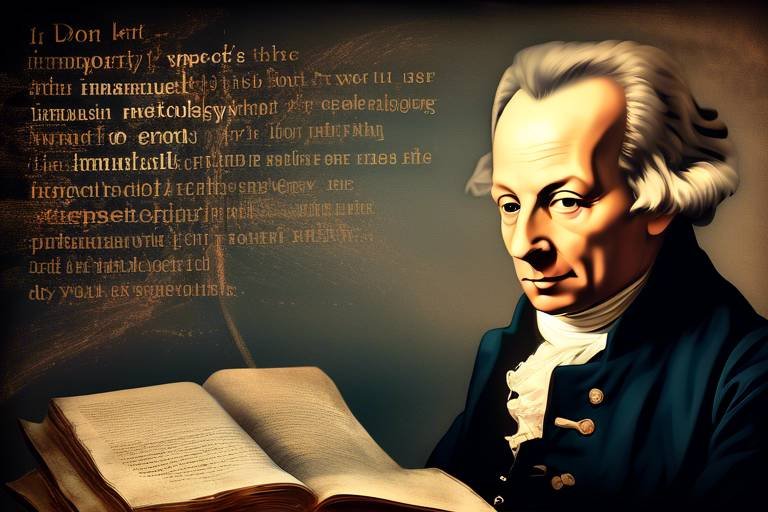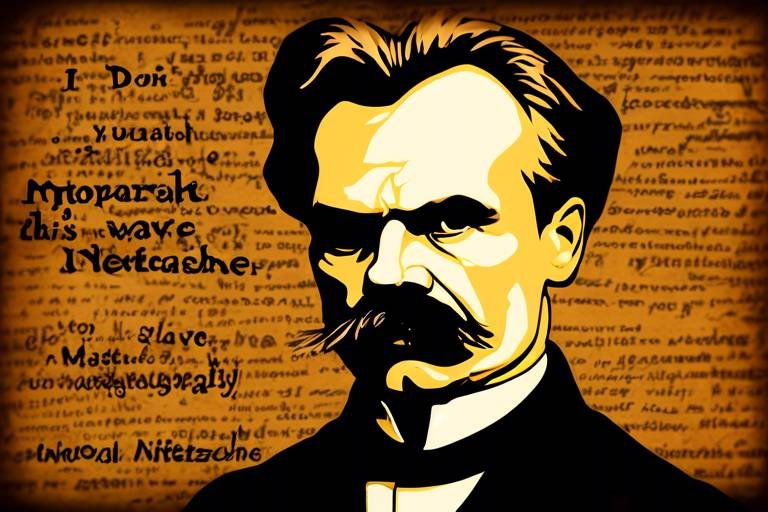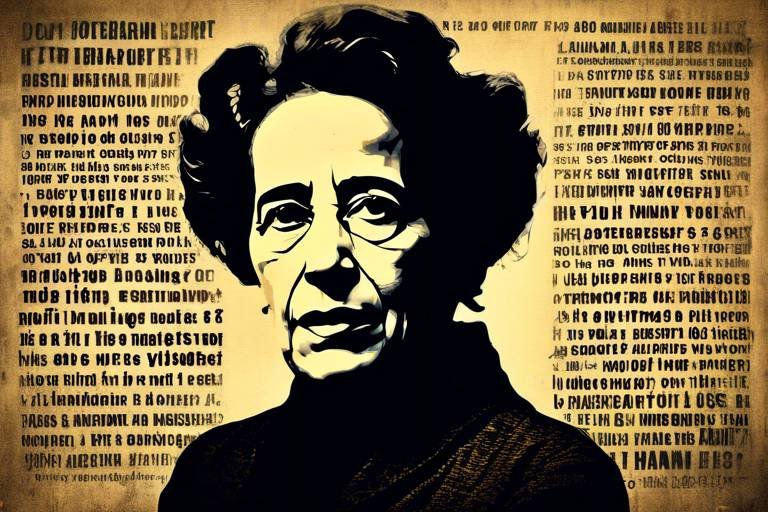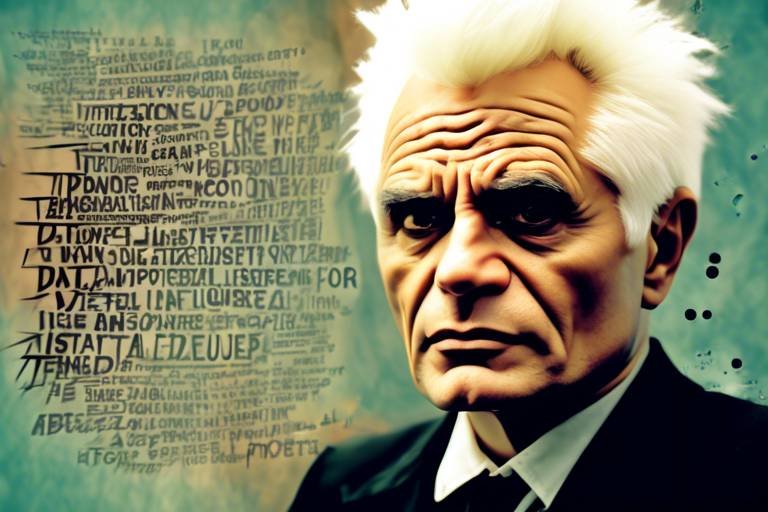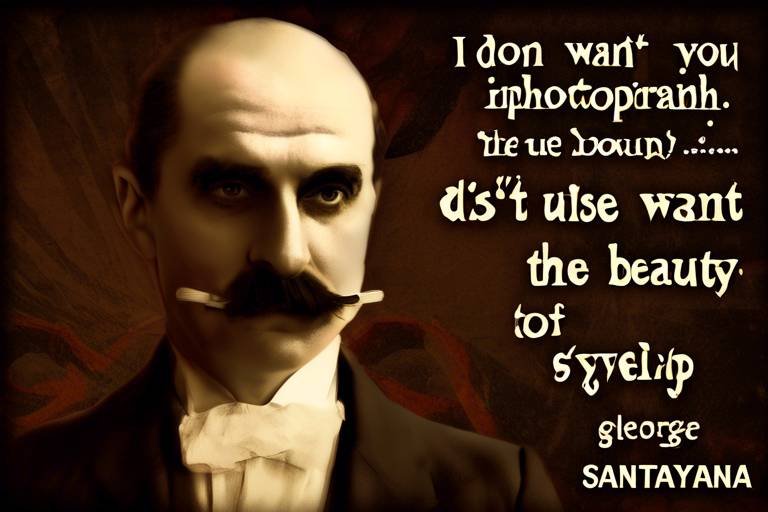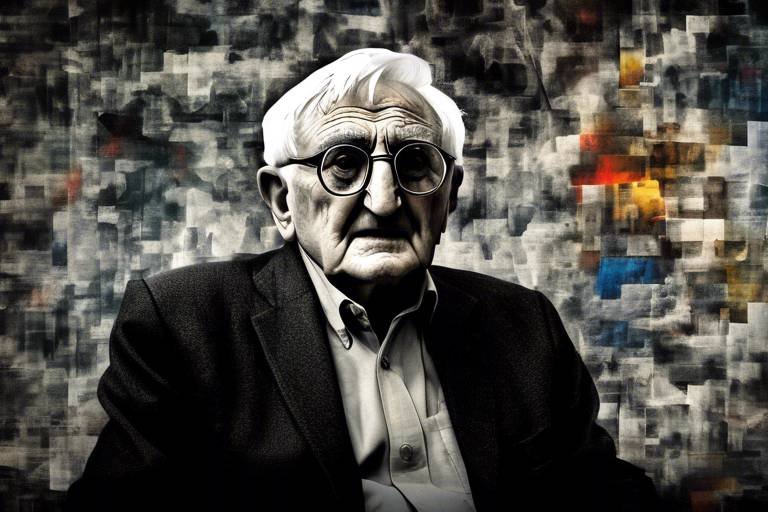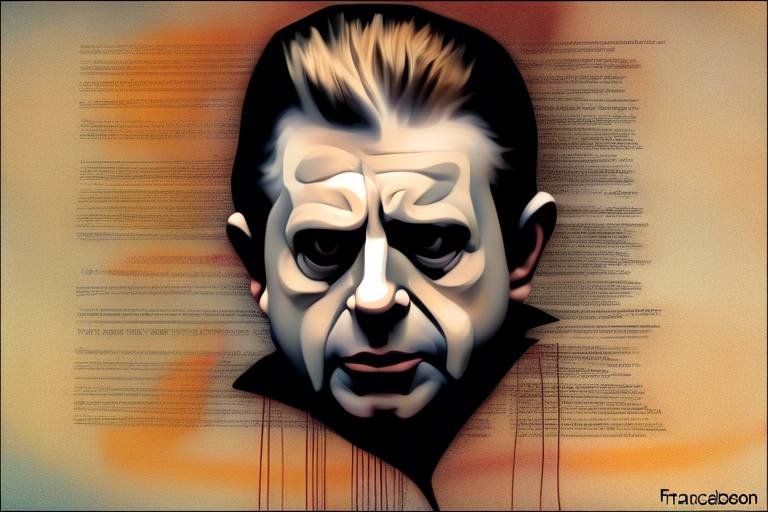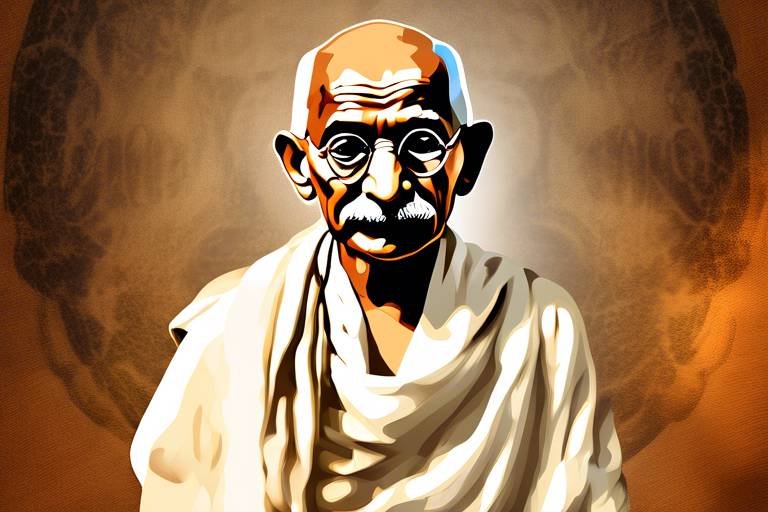Descartes vs. Spinoza - Who was More Influential?
The philosophical landscape of the 17th century was a vibrant tapestry woven with the threads of reason, existence, and the nature of reality. At the heart of this intellectual revolution stood two towering figures: René Descartes and Baruch Spinoza. Each philosopher carved out a unique path that not only challenged the prevailing thoughts of their time but also laid the groundwork for modern philosophy. Their ideas continue to resonate, prompting the question: Who was more influential? This article delves into their contributions, methodologies, and the legacies they left behind, ultimately revealing the profound impact they had on the trajectory of philosophical thought.
To truly appreciate the philosophies of Descartes and Spinoza, we must first explore the historical context in which they thrived. The 17th century was a time of immense change, marked by the Scientific Revolution and the decline of medieval scholasticism. This period saw the rise of empirical observation and rational thought, challenging the traditional dogmas that had dominated for centuries. Descartes, often dubbed the father of modern philosophy, sought to establish a new foundation based on doubt and certainty. In contrast, Spinoza, influenced by Jewish mysticism and rationalist thought, proposed a monistic view of the universe, where God and nature were intertwined. This backdrop of intellectual ferment not only shaped their ideas but also set the stage for a philosophical rivalry that would echo through the ages.
At the core of Descartes' philosophy lies the famous dictum, "Cogito, ergo sum" (I think, therefore I am). This assertion underscores his belief in the primacy of consciousness and the certainty of self-existence. In contrast, Spinoza's philosophy is rooted in a pantheistic view, suggesting that everything is part of a single substance he referred to as God or Nature. This fundamental difference in their understanding of substance and existence creates a fascinating intellectual rivalry. Where Descartes saw a dualism between mind and body, Spinoza argued for a unified reality, challenging the very nature of existence itself. Their differing views on reality not only highlight their unique philosophies but also set the stage for ongoing debates in metaphysics.
The methodologies employed by Descartes and Spinoza further illustrate their philosophical divergence. Descartes is often associated with rationalism, emphasizing the role of reason as the path to knowledge. His method of systematic doubt involved questioning everything until reaching an indubitable foundation. Conversely, Spinoza’s approach was more empirical and geometric, as he sought to derive truths from self-evident axioms, much like a mathematician. This methodological contrast not only reflects their individual philosophical pursuits but also highlights the broader debate between rationalism and empiricism that continues to influence modern thought.
Both philosophers produced seminal texts that encapsulate their ideas and philosophies. Descartes' Meditations on First Philosophy is a cornerstone of Western thought, where he meticulously outlines his method of doubt and the quest for certainty. On the other hand, Spinoza's Ethics presents a comprehensive system that intertwines ethics, metaphysics, and epistemology, offering a radical rethinking of the nature of God, humanity, and the universe. These key works not only serve as a testament to their intellectual prowess but also as a foundation for future philosophical inquiry.
The influence of Descartes and Spinoza on modern philosophy is profound and multifaceted. Descartes' emphasis on reason and skepticism laid the groundwork for the Enlightenment, inspiring thinkers such as Immanuel Kant and David Hume. Meanwhile, Spinoza's ideas on substance and ethics have permeated various philosophical movements, including existentialism and modern metaphysics. Their legacies continue to shape contemporary discussions on the nature of reality, consciousness, and morality, illustrating the enduring relevance of their ideas.
When it comes to ethics, Descartes and Spinoza present contrasting views. Descartes believed in a moral framework grounded in the rational understanding of God and the inherent goodness of the divine. He posited that understanding God's nature leads to virtuous living. In contrast, Spinoza offered a more naturalistic view of ethics, arguing that virtue arises from understanding the natural order and our place within it. His ethics emphasize the importance of reason in making moral decisions, suggesting that true happiness comes from aligning oneself with the rational structure of the universe. This divergence in ethical thought not only highlights their philosophical differences but also raises questions about the nature of morality itself.
The legacies of Descartes and Spinoza are far-reaching, influencing countless philosophers and schools of thought. Descartes is often heralded as the father of modern philosophy, while Spinoza is celebrated for his radical ideas that challenged the status quo. Their works continue to be revisited and reinterpreted in contemporary philosophical discourse, reflecting the complexity and richness of their ideas. The ongoing debate about their respective influences serves as a reminder of the dynamic nature of philosophy and its ability to evolve over time.
As we reflect on the philosophical contributions of Descartes and Spinoza, the question of who was more influential remains a vibrant topic of discussion. Both philosophers have left an indelible mark on the landscape of thought, each offering unique insights that continue to inspire and provoke. The enduring significance of their ideas speaks to the complexity of philosophy itself, reminding us that the quest for understanding is as much about the questions we ask as the answers we seek.
- What are the main differences between Descartes and Spinoza? Descartes focused on dualism and the certainty of self-existence, while Spinoza emphasized monism and the unity of substance.
- How did Descartes influence modern philosophy? Descartes' method of doubt and emphasis on reason laid the groundwork for Enlightenment thought and rationalism.
- What is Spinoza's view on ethics? Spinoza believed that ethics should be grounded in understanding the natural order and the role of reason in achieving happiness.
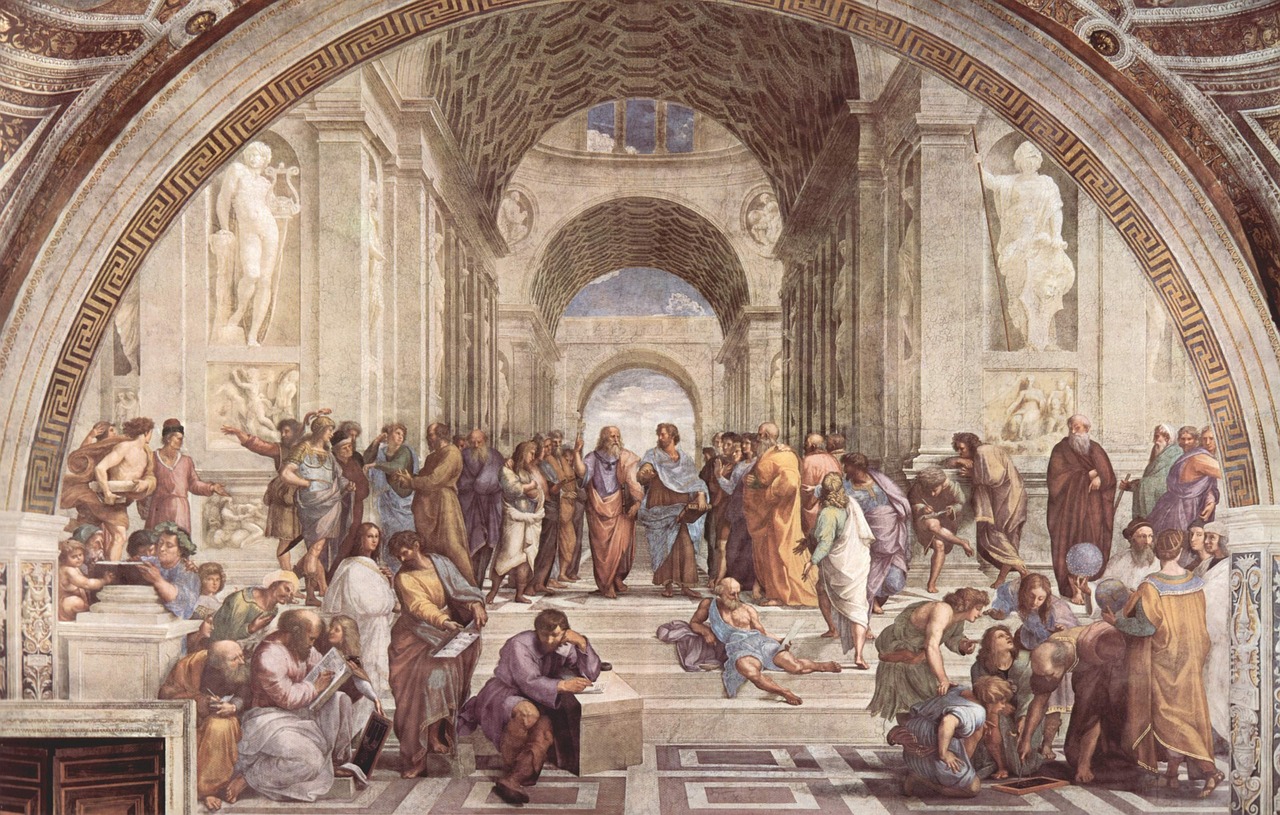
Historical Context
The 17th century was a period of remarkable transformation in Europe, marked by profound shifts in scientific, political, and philosophical thought. This era, often referred to as the Age of Enlightenment, laid the groundwork for modern philosophy, and it is within this vibrant context that the ideas of René Descartes and Baruch Spinoza emerged. Their philosophies did not develop in a vacuum; rather, they were responses to the tumultuous intellectual climate of their time, which was characterized by a growing emphasis on reason and empirical evidence.
During this period, Europe was grappling with the aftermath of the Renaissance, a movement that revived classical learning and encouraged critical thinking. This revival challenged traditional authority, particularly that of the Church, and set the stage for new ways of understanding the world. The scientific revolution, spearheaded by figures like Galileo and Newton, further propelled this shift by advocating for observation and experimentation as means to acquire knowledge. In this environment, Descartes and Spinoza sought to construct their philosophical systems that reflected these new ideals.
Descartes, often hailed as the father of modern philosophy, introduced a method of doubt that questioned everything that could be doubted, ultimately leading him to his famous conclusion, "Cogito, ergo sum" (I think, therefore I am). His emphasis on reason and mathematical principles as the foundation for knowledge was revolutionary. On the other hand, Spinoza's approach was more radical, advocating for a form of rationalism that viewed God and nature as one and the same, challenging the anthropocentric views of his time. His pantheistic perspective was a significant departure from traditional religious thought, positioning him as a controversial figure in the philosophical landscape.
The political landscape was equally influential, with the rise of nation-states and the decline of feudal systems reshaping societal structures. The Thirty Years' War (1618-1648), a devastating conflict that ravaged Europe, also played a crucial role in shaping the philosophical discourse. The war raised questions about human nature, morality, and the role of reason in governance, themes that both Descartes and Spinoza would grapple with in their works.
In summary, the historical context of the 17th century, with its blend of scientific inquiry, political upheaval, and a shift towards rational thought, provided a fertile ground for the ideas of Descartes and Spinoza. Their philosophies not only responded to the challenges of their time but also laid the groundwork for future generations of thinkers. As we delve deeper into their contributions, we can see how their ideas continue to echo through the corridors of modern philosophical discourse.
- What were the main influences on Descartes' philosophy?
Descartes was influenced by the scientific revolution, particularly the works of Galileo and the mathematical principles of his time. His experiences during the turbulent political climate of Europe also shaped his thoughts. - How did Spinoza's views differ from Descartes'?
While Descartes emphasized dualism and the separation of mind and body, Spinoza proposed a monistic view, arguing that God and nature are one and the same, which challenged traditional religious beliefs. - Why is the 17th century significant for philosophy?
The 17th century marked a transition from medieval scholasticism to modern philosophical inquiry, emphasizing reason, empirical evidence, and individual thought, which laid the foundation for contemporary philosophy.

Philosophical Foundations
When we dive into the philosophical foundations of René Descartes and Baruch Spinoza, we uncover a rich tapestry of ideas that laid the groundwork for modern philosophy. Their thoughts are like two rivers flowing from the same mountain, yet they carve out distinctly different landscapes. Descartes, often hailed as the father of modern philosophy, is known for his method of doubt and emphasis on rationalism. He famously declared, "Cogito, ergo sum" or "I think, therefore I am," suggesting that the very act of thinking proves one's existence. This radical skepticism was his way of stripping away uncertainties to arrive at an indubitable foundation for knowledge.
On the other hand, Spinoza took a different route, advocating for a pantheistic view of the universe. He viewed God and nature as one and the same, which radically shifted the understanding of divinity and existence. For Spinoza, everything that exists is a part of a single substance, which he referred to as "God or Nature." This idea challenges the dualistic separation of mind and body that Descartes proposed. While Descartes saw the world in terms of distinct substances—thinking substance (mind) and extended substance (body)—Spinoza argued that these are merely different attributes of the same underlying reality.
To illustrate their contrasting views on substance, let’s take a look at the following table:
| Aspect | René Descartes | Baruch Spinoza |
|---|---|---|
| Substance | Dualism (Mind vs. Body) | Monism (One Substance) |
| View of God | Transcendent Creator | Immanent (God is Nature) |
| Knowledge Acquisition | Rationalism (Reason as the path to knowledge) | Empiricism (Knowledge through experience) |
While Descartes sought certainty through mathematics and logic, Spinoza emphasized the importance of understanding the world through a comprehensive, holistic perspective. This difference is crucial in understanding their legacies; Descartes' emphasis on individual thought and clear reasoning paved the way for modern science and philosophy, whereas Spinoza's interconnected view of existence offered a profound understanding of ethics and morality. The philosophical foundations they laid not only shaped their own thoughts but also influenced countless thinkers who followed.
In essence, the philosophical foundations of Descartes and Spinoza represent two sides of the same coin—the quest for understanding ourselves and the universe. Their ideas continue to spark debates and inspire new generations of philosophers, proving that the questions they raised are as relevant today as they were in the 17th century. As we navigate through their philosophies, we find ourselves pondering not just the nature of reality, but also our place within it.
- What is Descartes' main contribution to philosophy? Descartes is best known for his method of systematic doubt and the famous phrase "Cogito, ergo sum," which emphasizes the importance of rational thought.
- How does Spinoza's view of God differ from traditional views? Spinoza's pantheism suggests that God and nature are one, challenging the traditional view of a transcendent God who is separate from the universe.
- What is the significance of the mind-body problem in philosophy? The mind-body problem addresses the relationship between mental states and physical states, a central theme in the works of both Descartes and Spinoza.
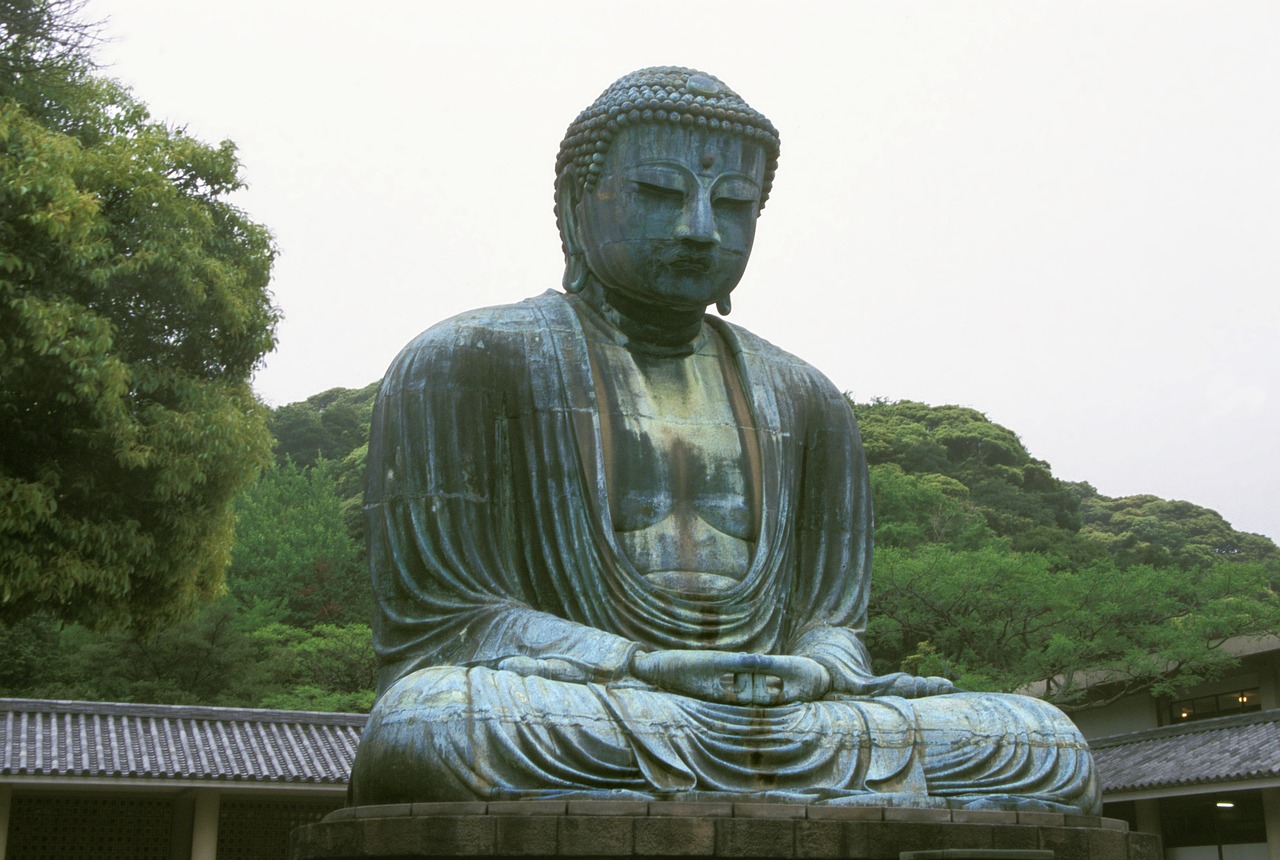
Methodology and Approach
When diving into the philosophical ocean that is René Descartes and Baruch Spinoza, it’s crucial to understand how their distinct methodologies shaped their ideas. Think of Descartes as a meticulous architect, laying a foundation of rationalism that aimed to construct an indestructible structure of knowledge. His approach was systematic, starting from a point of absolute doubt, famously declaring, “I think, therefore I am.” This method, known as methodical doubt, was his way of peeling back the layers of uncertainty to arrive at undeniable truths. He believed that through reason and mathematical principles, one could ascertain the nature of reality.
On the other hand, Spinoza took a more organic approach, akin to a gardener nurturing a growing plant. His philosophy was deeply intertwined with pantheism, the belief that God and nature are one and the same. Rather than starting from doubt, Spinoza embraced a more holistic view of existence, proposing that everything is interconnected. His methodology was geometric in nature, as seen in his seminal work, Ethics, where he laid out his arguments in a series of definitions and propositions, similar to a mathematical proof. This approach aimed to demonstrate the rational structure of reality, where everything follows from the nature of God or substance.
The contrast between their methods can be summarized in the following table:
| Aspect | Descartes | Spinoza |
|---|---|---|
| Starting Point | Doubt and skepticism | Acceptance of existence |
| Philosophical Method | Analytical and systematic | Geometric and holistic |
| View of God | Transcendent creator | Immanent substance |
| Nature of Reality | Dualistic (mind and body) | Monistic (one substance) |
Both philosophers sought to understand the world, but their paths diverged significantly. Descartes' rationalism emphasized the power of human reason as the primary tool for understanding existence, while Spinoza’s pantheistic view suggested that understanding the universe requires an appreciation of its unity and interconnectedness. This fundamental difference in their methodologies not only shaped their philosophical inquiries but also laid the groundwork for the debates that would follow in the centuries to come.
In essence, while Descartes constructed his philosophical edifice brick by brick, Spinoza cultivated a rich garden of ideas, illustrating the beauty of existence through the lens of unity and substance. Understanding these methodologies is crucial for grasping the broader implications of their thoughts and the lasting impact they have had on the field of philosophy.
- What is Descartes' main philosophical contribution? Descartes is known for his method of doubt and the idea of dualism, which separates mind and body.
- How does Spinoza's view of God differ from Descartes'? Spinoza sees God as synonymous with nature, while Descartes views God as a transcendent creator.
- Why is the methodology important in philosophy? Methodology shapes how philosophers approach questions about existence, knowledge, and reality, influencing their conclusions and impact.

Key Works
When diving into the philosophies of René Descartes and Baruch Spinoza, it’s essential to examine their key works, which serve as the foundation for their thoughts and ideas. Descartes is perhaps best known for his monumental work, Meditations on First Philosophy, published in 1641. In this text, he embarks on a journey of doubt and inquiry, famously declaring, “Cogito, ergo sum” or “I think, therefore I am.” This statement encapsulates his rationalist approach, emphasizing the importance of doubt as a precursor to certainty. Descartes explores the existence of God, the nature of the soul, and the distinction between mind and body, laying the groundwork for modern philosophy.
On the other hand, Spinoza’s magnum opus, Ethics, published posthumously in 1677, presents a radically different perspective. In this work, Spinoza introduces his concept of pantheism, suggesting that God and nature are one and the same. His work is structured geometrically, mirroring the precision of mathematical proofs, and argues for the interconnectedness of all things. Spinoza’s exploration of substance, attributes, and modes challenges traditional notions of God and existence, positioning him as a pivotal figure in the transition from medieval to modern thought.
To further illustrate the distinctions between their key works, let’s take a look at a comparative table:
| Philosopher | Key Work | Publication Year | Main Themes |
|---|---|---|---|
| René Descartes | Meditations on First Philosophy | 1641 | Doubt, Certainty, Existence of God, Mind-Body Dualism |
| Baruch Spinoza | Ethics | 1677 | Pantheism, Substance, Nature, Interconnectedness |
The impact of these works cannot be overstated. Descartes’ Meditations laid the groundwork for modern epistemology and metaphysics, influencing countless philosophers and scientists. His method of systematic doubt and analytical thinking opened new avenues for inquiry, making it a cornerstone of Western philosophy. In contrast, Spinoza’s Ethics challenged the very fabric of religious and philosophical thought of his time. By asserting that God is synonymous with nature, he paved the way for Enlightenment thinkers and modern secular philosophy.
In summary, while Descartes and Spinoza approached philosophy from different angles, their key works remain crucial to understanding the evolution of modern thought. Their writings not only reflect their individual philosophies but also serve as a dialogue between two distinct yet interrelated perspectives that continue to resonate in contemporary discussions.
- What is the main difference between Descartes and Spinoza?
Descartes is known for his rationalism and dualistic view of mind and body, while Spinoza is recognized for his pantheism and monistic view of existence.
- Why are Descartes' and Spinoza's works still relevant today?
Their ideas about existence, knowledge, and the nature of reality continue to influence modern philosophy, science, and ethics.
- What can we learn from their philosophical debates?
Their contrasting views highlight the richness of philosophical inquiry and the importance of questioning assumptions in our understanding of the world.

Meditations
René Descartes' Meditations on First Philosophy stands as a monumental work in the landscape of Western philosophy. Published in 1641, this text is not merely a philosophical treatise; it's a profound exploration of existence, knowledge, and the nature of reality. Descartes embarks on a journey of doubt, stripping away all that can be questioned to arrive at an indubitable foundation of knowledge. His famous declaration, "Cogito, ergo sum" (I think, therefore I am), encapsulates this quest for certainty. Through this lens, Descartes invites readers to reconsider the essence of existence itself, making them ponder: what does it truly mean to be?
The structure of the is particularly noteworthy. It comprises six meditations, each building upon the last, leading readers through a carefully crafted path of reasoning. In the first meditation, Descartes introduces radical skepticism, challenging the reliability of the senses and the physical world. He posits that if one can doubt, then one must exist as a thinking entity. This foundational thought sets the stage for subsequent meditations, where he seeks to establish the existence of God and the immortality of the soul.
In the second meditation, Descartes delves deeper into the nature of the self. Here, he argues that the mind, or soul, is distinct from the body, laying the groundwork for dualism. This separation of mind and body raises fascinating questions about consciousness and identity, resonating with many philosophical debates that followed. The third meditation shifts focus to the existence of God, where Descartes presents his ontological argument, suggesting that the very idea of a perfect being necessitates its existence.
Descartes' methodology is pivotal in understanding his influence. He employs a systematic approach, emphasizing rationalism—the belief that reason is the primary source of knowledge. This contrasts sharply with Spinoza's more holistic view, which integrates emotion and intuition into the understanding of reality. The tension between these two approaches highlights a broader philosophical debate: is knowledge best acquired through reason, or is it enriched by experience and emotion?
The have not only shaped the trajectory of modern philosophy but also laid the groundwork for various fields, including psychology, epistemology, and metaphysics. Descartes' insistence on doubt as a precursor to knowledge has influenced countless thinkers, prompting them to question the very foundations of their beliefs. In a world where certainty often feels elusive, Descartes' approach remains relevant, urging us to engage in our own meditative practices of inquiry.
In summary, Descartes' serves as a cornerstone of modern thought, challenging us to confront our beliefs and the nature of existence. His legacy endures, inviting each generation to grapple with the fundamental questions of life, reality, and knowledge. As we navigate our own philosophical inquiries, we may find ourselves echoing Descartes’ call to think critically and doubt boldly.
- What is the main idea of Descartes' Meditations?
The main idea revolves around the quest for certainty and the exploration of existence through doubt and rational thought. - How does Descartes' philosophy differ from Spinoza's?
Descartes emphasizes rationalism and dualism, while Spinoza advocates for pantheism and the unity of substance. - Why is "Cogito, ergo sum" significant?
This phrase encapsulates Descartes' argument that the act of thinking is proof of one's existence, forming a foundational element of modern philosophy.

and Spinoza's
Understanding the historical backdrop of Descartes and Spinoza helps illuminate their philosophical perspectives and the intellectual climate of the 17th century, which shaped their ideas and debates.
A comparison of the foundational philosophies of Descartes and Spinoza reveals their differing views on substance, existence, and the nature of reality, forming the basis for their intellectual rivalry.
Examining the distinct methodologies employed by Descartes and Spinoza highlights their unique approaches to philosophical inquiry, including Descartes' rationalism and Spinoza's pantheism.
Analyzing the key texts of both philosophers, such as Descartes' Meditations and Spinoza's Ethics, provides insight into their core ideas and contributions to philosophy.
The impact of Descartes and Spinoza on subsequent philosophical thought is profound, influencing various schools of thought and shaping the trajectory of modern philosophy.
Exploring the ethical frameworks proposed by Descartes and Spinoza reveals their differing views on morality, virtue, and the role of reason in ethical decision-making.
The legacy of Descartes and Spinoza continues to resonate in contemporary philosophical discourse, with their ideas being revisited and reinterpreted by modern thinkers.
The debate over who was more influential, Descartes or Spinoza, remains a vital discussion in philosophy, reflecting their enduring significance and the complexity of their ideas.
- What is the main difference between Descartes and Spinoza?
While Descartes emphasized rationalism and the certainty of the self, Spinoza focused on pantheism and the interconnectedness of all things.
- How did Descartes influence modern science?
Descartes' method of doubt and emphasis on reason laid the groundwork for the scientific method, encouraging a more analytical approach to understanding the natural world.
- In what ways did Spinoza's ideas challenge traditional views of God?
Spinoza’s pantheistic view equated God with nature, challenging the anthropomorphic conception of God prevalent in the Abrahamic traditions.

Ethics,
When diving into the ethical frameworks proposed by René Descartes and Baruch Spinoza, we encounter a fascinating landscape filled with contrasting views on morality, virtue, and the role of reason in ethical decision-making. Imagine walking through a dense forest where each path represents a different philosophical approach to ethics; Descartes and Spinoza each carved out their own distinct trails, leading to unique insights about what it means to live a good life.
Descartes, often hailed as the father of modern philosophy, approached ethics with a strong emphasis on reason and rationality. For him, moral principles could be derived through clear and distinct ideas, much like a mathematician deriving a theorem through logical steps. He believed that by applying reason, individuals could arrive at universal truths regarding right and wrong. Descartes argued that the ultimate goal of human life is to achieve a state of clarity and understanding, which in turn guides moral actions. In his view, ethics is not just about adhering to societal norms; it’s about the pursuit of knowledge and the cultivation of one’s intellect.
On the other hand, Spinoza’s ethical framework is deeply intertwined with his metaphysical views. He proposed that everything is interconnected and that understanding the nature of reality is essential to ethical living. For Spinoza, virtue is synonymous with power—the power to act according to one’s true nature and the essence of the universe. He believed that moral actions arise from an understanding of the natural world and our place within it. Spinoza famously stated that “the more we understand ourselves and our emotions, the more we can act ethically.” This perspective emphasizes the importance of self-knowledge and emotional intelligence in ethical decision-making.
To further illustrate their differing approaches, here’s a brief comparison:
| Aspect | Descartes | Spinoza |
|---|---|---|
| Source of Ethics | Rationality and clear ideas | Understanding of nature and interconnectedness |
| View on Virtue | Intellectual clarity | Power to act according to one's essence |
| Role of Emotions | Potentially misleading | Essential for understanding ethics |
| Ultimate Goal | Knowledge and understanding | Living in accordance with nature |
While both philosophers offer profound insights, their ethical frameworks highlight a fundamental question: Is morality best understood through the lens of reason, or is it rooted in our emotional and natural existence? This debate is not merely academic; it shapes how we engage with the world around us and informs our personal moral compass.
In conclusion, the ethical theories of Descartes and Spinoza provide us with rich, contrasting perspectives that continue to influence modern thought. Their legacies invite us to reflect on our own values and the principles that guide our actions. The journey through their philosophies is not just an exploration of ideas, but a call to engage with the essence of what it means to be human.
- What are the main differences between Descartes' and Spinoza's ethical theories?
Descartes emphasizes reason and intellectual clarity, while Spinoza focuses on understanding nature and emotional intelligence. - How do Descartes' ideas influence modern ethical thought?
Descartes' rationalist approach laid the groundwork for many contemporary ethical theories that prioritize reason and logic. - Can Spinoza's views on ethics be applied today?
Yes, Spinoza's emphasis on interconnectedness and self-understanding resonates with modern discussions on emotional intelligence and ethics.

provides insight into their core ideas and contributions to philosophy.
When diving into the philosophical waters of René Descartes and Baruch Spinoza, we find ourselves exploring two distinct yet interconnected realms of thought. Each philosopher's key works serve as a beacon, illuminating their core ideas and contributions to the vast ocean of philosophy. Descartes, often regarded as the father of modern philosophy, is best known for his seminal text, Meditations on First Philosophy. In this work, he famously declares, "Cogito, ergo sum" (I think, therefore I am), establishing a foundation for his epistemology rooted in doubt and certainty. This phrase encapsulates his belief in the primacy of consciousness and the self as the starting point for all knowledge. Descartes' method of systematic doubt not only revolutionized the way we approach philosophical inquiry but also laid the groundwork for the scientific method, emphasizing reason as a tool to uncover truth.
On the other hand, Spinoza's magnum opus, Ethics, presents a radically different perspective. Spinoza’s work is characterized by its geometric method, where he seeks to derive truths about existence and God through a series of definitions and propositions. One of his most provocative ideas is the notion of pantheism, where he equates God with nature, suggesting that everything that exists is a manifestation of the divine. This radical rethinking of God and the universe challenges traditional religious views and emphasizes a more interconnected understanding of reality. In Ethics, Spinoza argues that knowledge and understanding lead to a form of freedom, where the understanding of our emotions and desires can lead to greater ethical living.
Both philosophers, while exploring different aspects of existence, contribute significantly to the discourse on substance and reality. Descartes posits a dualistic view, separating mind and body, which has sparked endless debates about the nature of consciousness. In contrast, Spinoza’s monism suggests that there is only one substance, which is both God and nature, thus challenging the very fabric of Cartesian dualism. This philosophical rivalry not only highlights their differences but also showcases their profound influence on modern thought.
To further illustrate their contributions, let’s take a look at a comparative table summarizing their key ideas:
| Aspect | René Descartes | Baruch Spinoza |
|---|---|---|
| Philosophical Approach | Rationalism | Pantheism |
| Key Work | Meditations on First Philosophy | Ethics |
| View of God | Transcendent Creator | Immanent Substance |
| Nature of Reality | Dualism (Mind vs. Body) | Monism (One Substance) |
| Methodology | Systematic Doubt | Geometric Method |
In conclusion, the key works of Descartes and Spinoza not only provide a glimpse into their philosophical minds but also set the stage for ongoing discussions in ethics, metaphysics, and epistemology. Their ideas continue to resonate, prompting us to question our understanding of existence, knowledge, and the divine. As we reflect on their contributions, we can't help but wonder: How do their philosophies shape our understanding of the world today?
- What are the main differences between Descartes and Spinoza? Descartes emphasizes rationalism and dualism, while Spinoza advocates for pantheism and monism.
- How did Descartes influence modern science? His method of systematic doubt laid the groundwork for the scientific method, encouraging a focus on reason and empirical evidence.
- What is the significance of Spinoza’s Ethics? It challenges traditional views of God and nature, proposing a unified understanding of existence that emphasizes the importance of knowledge and ethical living.

Influence on Modern Philosophy
The influence of René Descartes and Baruch Spinoza on modern philosophy is nothing short of monumental. Their ideas have shaped the very foundations of contemporary thought, impacting a vast array of disciplines, including science, ethics, and metaphysics. Descartes, often referred to as the father of modern philosophy, introduced a method of doubt that challenged existing beliefs and laid the groundwork for the scientific method. His famous dictum, "I think, therefore I am," encapsulates his belief in the primacy of the individual mind as the starting point for knowledge. This radical shift encouraged later philosophers to prioritize reason and skepticism in their inquiries.
On the other hand, Spinoza's contributions are equally significant, particularly in his holistic view of the universe and the interconnectedness of all things. His assertion that "God or Nature" is a single substance has profound implications for pantheism and has influenced ecological thought by emphasizing the unity of existence. This perspective encourages a sense of responsibility towards the environment and challenges anthropocentric views that dominate modern discourse.
To illustrate their impact, consider the following table highlighting key areas where Descartes and Spinoza's philosophies have left their mark:
| Area of Influence | Descartes' Contribution | Spinoza's Contribution |
|---|---|---|
| Metaphysics | Dualism: Mind vs. Body | Monism: Everything is one substance |
| Epistemology | Rationalism: Knowledge through reason | Intuition: Knowledge through understanding of the whole |
| Ethics | Morality based on clear and distinct perceptions | Ethics derived from the nature of reality and reason |
| Political Philosophy | Social contract theory | Democratic ideals and freedom |
Moreover, the philosophical debate between rationalism and empiricism, which emerged in the wake of Descartes and Spinoza, continues to be a central theme in modern philosophy. Descartes' insistence on the role of reason sparked discussions that led to the development of empiricism, with philosophers like John Locke and David Hume challenging the idea that knowledge could be derived solely from rational thought. This ongoing dialogue underscores the dynamic nature of philosophical inquiry and the enduring relevance of both thinkers.
In contemporary discussions, we also see echoes of Spinoza's ideas in the fields of psychology and cognitive science, where the interconnectedness of thoughts and emotions is increasingly acknowledged. His emphasis on understanding human behavior through the lens of a unified substance has paved the way for holistic approaches in therapy and mental health, promoting a view of individuals as part of a larger whole.
In conclusion, both Descartes and Spinoza have profoundly influenced modern philosophy, albeit in different ways. Their legacies continue to inspire and challenge thinkers today, making their contributions not just historical footnotes but active elements in the ongoing quest for understanding the human experience.
- What is the main difference between Descartes and Spinoza? Descartes is known for his dualism and emphasis on reason, while Spinoza proposed a monistic view where everything is interconnected as one substance.
- How did Descartes influence modern science? His method of doubt and rational inquiry laid the groundwork for the scientific method, encouraging critical thinking and skepticism.
- What is Spinoza's view on God? Spinoza identified God with nature, suggesting that everything in the universe is part of a single, divine substance.

Ethics and Morality
When diving into the philosophical waters of ethics and morality, the contrast between René Descartes and Baruch Spinoza becomes strikingly clear. Both thinkers approached the question of what it means to live a good life, yet their conclusions are as different as night and day. Descartes, often seen as the father of modern philosophy, emphasized the role of reason in ethical decision-making. He believed that through rational thought, individuals could arrive at moral truths. In his view, the ability to reason was not just a tool for understanding the world, but a guiding light for ethical conduct.
On the flip side, Spinoza's perspective was deeply intertwined with his pantheistic view of the universe. He posited that everything is part of a single substance, which he identified as God or Nature. For Spinoza, ethics was not about adhering to external rules or commands; instead, it was about understanding the natural order of things and aligning oneself with it. This meant that morality, in his eyes, was a reflection of the interconnectedness of all existence. He argued that true virtue arises from understanding our place within this grand tapestry of life, and acting in accordance with that understanding.
To illustrate their differing views on ethics, consider the following table that highlights key aspects of their moral philosophies:
| Aspect | René Descartes | Baruch Spinoza |
|---|---|---|
| Source of Morality | Rational thought and reason | Understanding of nature and interconnectedness |
| Nature of Ethics | Universal moral truths | Ethics as a reflection of natural laws |
| Role of Emotion | Emotion can cloud reason | Emotions are part of understanding human nature |
| Goal of Ethics | Achieving clarity and certainty in moral judgments | Living in harmony with the universe |
As we can see, Descartes placed a significant emphasis on the rational aspect of morality, where clear thinking leads to moral clarity. He considered emotions to be potential obstacles that could hinder our ability to make sound ethical decisions. In contrast, Spinoza viewed emotions as integral to the human experience, suggesting that understanding our emotions could lead to a deeper understanding of ourselves and our ethical responsibilities.
This divergence in thought raises an important question: can morality truly be objective if it is heavily influenced by our emotions and experiences? Descartes would argue that through reason, we can achieve a level of moral objectivity. Spinoza, however, would counter that our emotions and experiences are part of the natural order, and thus, they cannot be dismissed in the pursuit of ethical living.
In conclusion, the exploration of ethics and morality through the lenses of Descartes and Spinoza offers a rich tapestry of ideas. While Descartes champions the power of reason as the cornerstone of morality, Spinoza invites us to embrace the complexity of our emotional lives as essential to understanding our ethical obligations. This ongoing dialogue between reason and emotion continues to shape modern discussions on ethics, reminding us that the quest for moral understanding is as intricate as the human experience itself.
- What is the main difference between Descartes' and Spinoza's views on ethics? Descartes emphasizes reason as the source of morality, while Spinoza believes in understanding nature and interconnectedness.
- How do emotions play a role in their ethical frameworks? Descartes sees emotions as potential obstacles to reason, whereas Spinoza considers them essential for understanding human nature.
- Can morality be objective according to Descartes? Yes, Descartes argues that through rational thought, individuals can arrive at universal moral truths.
- What is Spinoza's view on virtue? Spinoza believes that true virtue arises from understanding our place in the universe and acting in harmony with it.

Legacy and Reception
The legacies of René Descartes and Baruch Spinoza are not just remnants of the past; they are living dialogues that continue to influence contemporary thought. Both philosophers have shaped various fields, from metaphysics to ethics, and their ideas have sparked countless debates among scholars and enthusiasts alike. Descartes, often hailed as the father of modern philosophy, introduced a new way of thinking that emphasized doubt and reason as the foundations of knowledge. His famous dictum, "Cogito, ergo sum" (I think, therefore I am), has become a cornerstone in discussions about consciousness and existence.
On the other hand, Spinoza's ideas about the interconnectedness of all things and his pantheistic view of God challenged the traditional notions of divinity and substance. He argued that everything in the universe is part of a single, unified reality, a concept that resonates with many modern scientific and philosophical perspectives. This radical perspective has led to Spinoza being regarded as a precursor to both existentialism and modern environmental ethics.
Interestingly, the reception of their ideas has evolved over time. For instance, during their lifetimes, both philosophers faced significant criticism and controversy. Descartes' dualism was often questioned, while Spinoza's radical views led to his excommunication from the Jewish community in Amsterdam. However, as the centuries passed, their contributions began to be recognized more widely. Today, philosophers and intellectuals revisit their works, often drawing parallels between their ideas and contemporary issues.
In academia, their legacies are explored through various lenses, including:
- Philosophy: Scholars study their writings to understand the evolution of modern philosophical thought.
- Science: Descartes' emphasis on rationalism and Spinoza's holistic approach have influenced scientific methodologies.
- Ethics: Their differing views on morality continue to be relevant in discussions about ethics and human behavior.
Moreover, their impact extends beyond philosophy into popular culture, where references to their ideas can be found in literature, film, and art. This cultural resonance speaks to the timelessness of their thoughts and the ongoing relevance of their discussions in our modern lives.
In conclusion, the legacies of Descartes and Spinoza are a testament to their profound influence on philosophical discourse and beyond. Their ideas continue to inspire and challenge thinkers, ensuring that the debate over their significance remains vibrant and essential in contemporary discussions.
- What are the main differences between Descartes and Spinoza?
Descartes focused on dualism and the separation of mind and body, while Spinoza emphasized a monistic view, seeing everything as part of one substance. - How did Descartes influence modern science?
Descartes' method of systematic doubt and emphasis on reason laid the groundwork for the scientific method, promoting a rational approach to inquiry. - Why was Spinoza excommunicated?
Spinoza's radical ideas about God and religion were deemed heretical by the Jewish community, leading to his excommunication in 1656. - Are Descartes and Spinoza still relevant today?
Absolutely! Their ideas continue to influence modern philosophy, ethics, and even science, making their works essential reading for anyone interested in these fields.
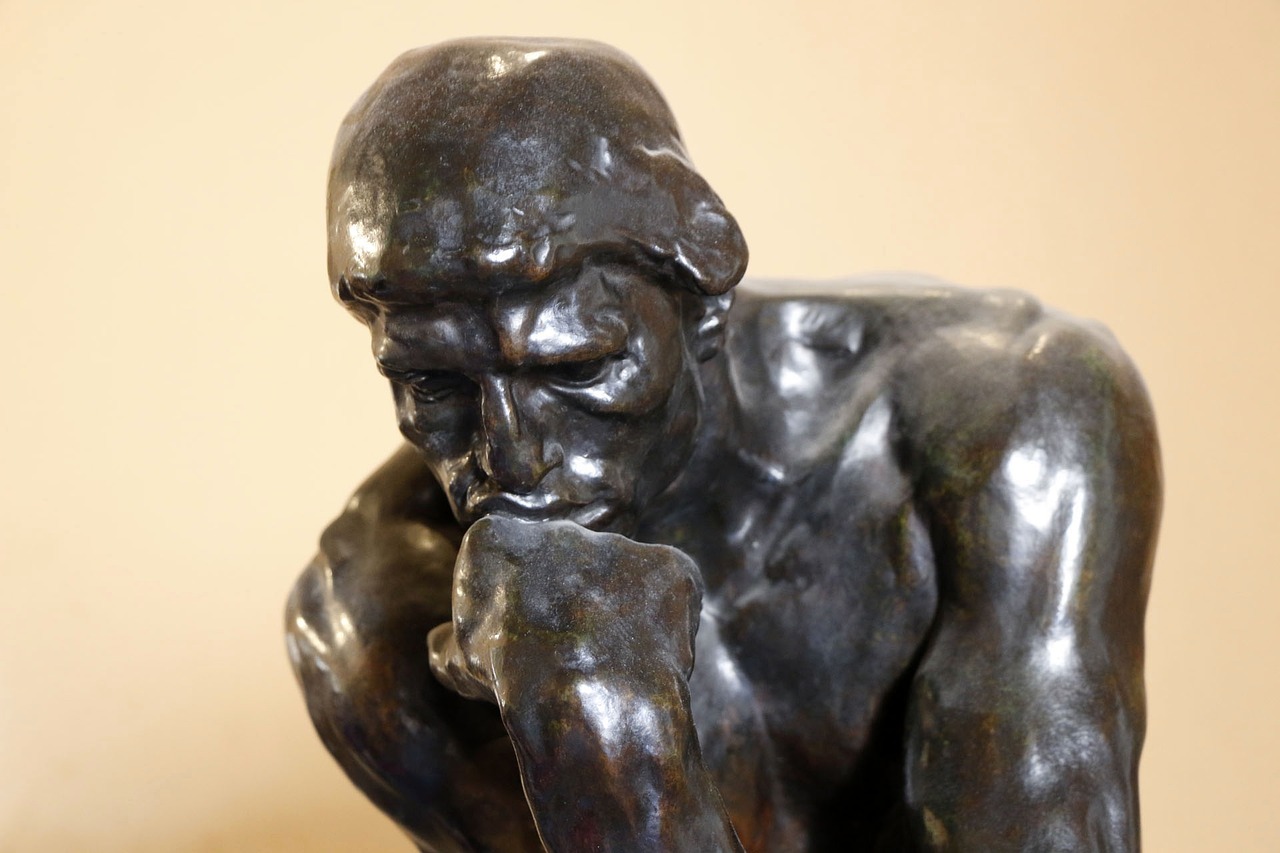
Conclusion: A Lasting Debate
As we wrap up our exploration of the philosophical giants, René Descartes and Baruch Spinoza, it's clear that the debate over who was more influential is not just a matter of historical interest but a vibrant discussion that continues to shape modern thought. Both philosophers brought unique perspectives that challenged the status quo of their time, and their ideas still resonate in contemporary philosophical discourse.
Descartes, often hailed as the father of modern philosophy, introduced a method of doubt that revolutionized the way we think about knowledge and existence. His famous dictum, "I think, therefore I am," encapsulates his belief in the primacy of reason. On the other hand, Spinoza's pantheistic view of the universe as a single substance challenged traditional notions of God and nature, proposing that everything is interconnected. This radical shift in thinking laid the groundwork for later developments in both philosophy and science.
In essence, the influence of these two thinkers can be seen in various domains:
- Metaphysics: Descartes' dualism versus Spinoza's monism.
- Ethics: Rationalism in Descartes' moral philosophy compared to Spinoza's virtue ethics.
- Epistemology: The role of doubt in Descartes' methodology against Spinoza's intuitive knowledge.
As modern philosophers revisit their works, it's evident that neither thinker can be easily dismissed. The dialogue between their ideas invites us to question our assumptions about reality, ethics, and the nature of existence itself. This ongoing conversation highlights the complexity of their thoughts and the relevance of their contributions to contemporary issues.
Ultimately, the question of who was more influential—Descartes or Spinoza—may never have a definitive answer. Instead, it serves as a reminder of the richness of philosophical inquiry and the importance of engaging with diverse perspectives. In this way, both philosophers remain vital figures in the landscape of modern philosophy, encouraging us to think critically and deeply about the world around us.
- Who was more influential, Descartes or Spinoza? The influence of both philosophers is significant, and opinions vary. Descartes is often credited with laying the groundwork for modern philosophy, while Spinoza's ideas challenge traditional views and have inspired various movements.
- What are the key differences between their philosophies? Descartes focused on rationalism and dualism, while Spinoza advocated for pantheism and a monistic view of reality.
- How do their ideas impact modern thought? Their ideas continue to influence various fields, including metaphysics, ethics, and epistemology, prompting ongoing debates in contemporary philosophy.
Frequently Asked Questions
- What are the main differences between Descartes and Spinoza?
Descartes is often seen as the father of modern philosophy, emphasizing rationalism and the importance of doubt as a method for acquiring knowledge. In contrast, Spinoza’s philosophy is rooted in pantheism, where he views God and nature as one. This fundamental difference shapes their views on existence, substance, and the nature of reality.
- How did Descartes and Spinoza influence modern thought?
Both philosophers have had a profound impact on modern philosophy. Descartes introduced the idea of methodological skepticism, which encourages questioning all assumptions. Spinoza, on the other hand, laid the groundwork for later developments in ethics and metaphysics, influencing thinkers like Hegel and Nietzsche. Their ideas continue to spark discussions and debates in contemporary philosophical circles.
- What are some key works of Descartes and Spinoza?
René Descartes is best known for his work Meditations on First Philosophy, where he explores the nature of existence and the essence of the self. Baruch Spinoza’s most significant work, Ethics, presents his views on God, nature, and human emotions, showcasing his unique approach to philosophy that intertwines ethics with metaphysical concepts.
- What was the historical context of Descartes and Spinoza's philosophies?
The 17th century was a time of great intellectual upheaval, marked by the Scientific Revolution and the rise of rational thought. Descartes and Spinoza were both products of this era, and their philosophies reflect the tensions between emerging scientific ideas and traditional religious beliefs. Understanding this context helps clarify their motivations and the significance of their contributions.
- How do Descartes and Spinoza differ in their views on ethics?
Descartes viewed ethics through a lens of rationality, emphasizing the role of reason in moral decision-making. He believed that understanding the world through reason leads to virtuous behavior. In contrast, Spinoza proposed that ethics is rooted in understanding our emotions and the interconnectedness of all things, suggesting that true virtue arises from knowledge of the universe and our place within it.
- Why is the debate over who was more influential, Descartes or Spinoza, still relevant today?
This debate remains significant because it highlights the ongoing impact of their ideas on contemporary philosophy. Each philosopher offers a distinct approach to understanding reality, knowledge, and ethics, which continues to resonate with modern thinkers. The discussion invites deeper exploration into the complexities of their philosophies and their implications for current philosophical discourse.



